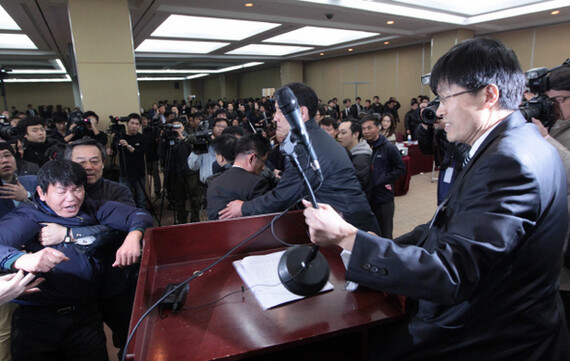hankyoreh
Links to other country sites 다른 나라 사이트 링크
FTA with China could spell disaster for agriculture

By Jung Eun-joo
Analysts are predicting that the signing of a free trade agreement with China would generate welfare effects of $27.59 billion from a 2.28% rise in real gross domestic product over ten years.
But observers expressed concern about job losses and other damages as Chinese products enter the domestic market in areas such as agriculture, fishing, and domestically-focused SMEs.
Welfare effects refer to the lowering of prices and increasing of consumer welfare through abolition of duties.
Korea Institute for International Economic Policy senior researcher Kim Yeong-gwi presented a report on possible macroeconomic effects of a South Korea-China FTA at a hearing Friday at the COEX convention center in Seoul's Samseong neighborhood.
The report predicted a 0.95% rise in real GDP and welfare effects of $17.65 billion within five years of the FTA taking effect, assuming a low-level agreement that omits sensitive areas such as agriculture. In the case of a more open agreement on the level of South Korea's current FTAs with the United States and the European Union, it predicted a 1.25% rise in real GDP and welfare effects of $23.33 billion over the same period. Kim predicted South Korea's trade surplus with China would increase to $2.8 billion per year.
The analysis showed possible benefits in the automotive sector. Korea Institute for Industrial Economics and Trade researcher Kim Seok-jin said, "For finished cars, there is a local production system, but key parts are supplied by Korea, so it would be advantageous for us in our competition with overseas automakers if high tariffs are eliminated."
Kim added that areas like machinery, steel, and electronics would also benefit, as they are subject to relatively high tariffs or have significant trade surpluses with China.
But Korea Small Business Institute research fellow Oh Dong-yoon said there are concerns about direct damages to businesses that cater mainly to the domestic market, including food and beverage products, as well as indirect damages to industries with a heavy focus on supplies, including chemicals, rubber, and plastics. Abolition of tariffs could lead large South Korean businesses to change to Chinese suppliers or to pressure SMEs to lower their prices.
Indeed, a 2008 survey of 500 manufacturing SMEs found 44.8%, or nearly half of them, saying an FTA with China would be the agreement with most negative impact. In contrast, 93.8% of Chinese businesses said they favored an FTA with South Korea.
Experts agreed that agriculture and fishing would bear the brunt of an agreement. The imbalance is already severe. South Korea had agricultural production of just 43 trillion won (about $38.2 billion) in 2009, compared to China's 2008 agricultural GDP of 168 trillion won (about $149.4 billion), and its agricultural trade deficit with China ran at $2.67 billion in 2010.
In fishing, too, Chinese products account for 30% of the import market, with a 2006 trade deficit of $959 million. Korea Rural Economic Institute senior researcher Eor Myung-keun said South Korean wholesale prices for 28 of the 31 major agricultural products averaged more than twice those of China for 2010 and 2011.
Agricultural product price figures for the two countries showed an eightfold difference for spinach, a sevenfold difference for sesame, six fold differences for green onions and carrots, and more than fivefold differences for eggplant, cucumbers, and pears.
Korea Maritime Institute senior researcher Jang Hong-suk said, "Since Korea's tariffs for fishing products are in the 17% to 18% range, which is higher than China's 10% to 14%, there is a good chance an FTA would lead to Chinese products taking the place of domestic ones."
Please direct questions or comments to [englishhani@hani.co.kr]
Editorial・opinion
![[Column] Park Geun-hye déjà vu in Yoon Suk-yeol [Column] Park Geun-hye déjà vu in Yoon Suk-yeol](https://flexible.img.hani.co.kr/flexible/normal/500/300/imgdb/original/2024/0424/651713945113788.jpg) [Column] Park Geun-hye déjà vu in Yoon Suk-yeol
[Column] Park Geun-hye déjà vu in Yoon Suk-yeol![[Editorial] New weight of N. Korea’s nuclear threats makes dialogue all the more urgent [Editorial] New weight of N. Korea’s nuclear threats makes dialogue all the more urgent](https://flexible.img.hani.co.kr/flexible/normal/500/300/imgdb/original/2024/0424/7317139454662664.jpg) [Editorial] New weight of N. Korea’s nuclear threats makes dialogue all the more urgent
[Editorial] New weight of N. Korea’s nuclear threats makes dialogue all the more urgent- [Guest essay] The real reason Korea’s new right wants to dub Rhee a founding father
- [Column] ‘Choson’: Is it time we start referring to N. Korea in its own terms?
- [Editorial] Japan’s rewriting of history with Korea has gone too far
- [Column] The president’s questionable capacity for dialogue
- [Column] Are chaebol firms just pizza pies for families to divvy up as they please?
- [Column] Has Korea, too, crossed the Rubicon on China?
- [Correspondent’s column] In Japan’s alliance with US, echoes of its past alliances with UK
- [Editorial] Does Yoon think the Korean public is wrong?
Most viewed articles
- 1‘We must say no’: Seoul defense chief on Korean, USFK involvement in hypothetical Taiwan crisis
- 2N. Korean delegation’s trip to Iran shows how Pyongyang is leveraging ties with Moscow
- 3Amnesty notes ‘erosion’ of freedom of expression in Korea in annual human rights report
- 4[Column] Park Geun-hye déjà vu in Yoon Suk-yeol
- 5‘Weddingflation’ breaks the bank for Korean couples-to-be
- 6[Reportage] On US campuses, student risk arrest as they call for divestment from Israel
- 7[Editorial] New weight of N. Korea’s nuclear threats makes dialogue all the more urgent
- 8Korea sees more deaths than births for 52nd consecutive month in February
- 9Will NewJeans end up collateral damage in internal feud at K-pop juggernaut Hybe?
- 10Why Korea shouldn’t welcome Japan’s newly beefed up defense cooperation with US